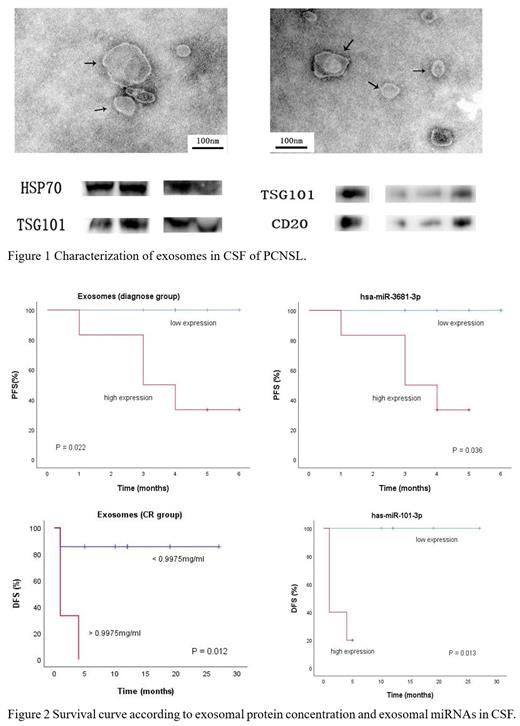Abstract
Purpose Primary central nervous system lymphoma (PCNSL) is a highly heterogeneous tumor. Therefore, it is crucial to identify biomarkers that can dynamically monitor disease progression for individualized treatment and to improve prognosis. Exosomes carry a large amount of genetic and proteomic information and are stable and easy to obtain. They play important roles in disease diagnosis, treatment, and prognosis. This study aimed to evaluate the use of cerebrospinal fluid (CSF) exosomes in patients with PCNSL as biomarkers of tumor evolution.
Methods From October 2021 to October 2022, patients diagnosed with PCNSL via pathology were selected from Beijing Tiantan Hospital affiliated to Capital Medical University. None of the patients had received any cancer-related treatment before diagnosis. Primary intraocular lymphoma and HIV-positive patients were excluded. Clinical information and laboratory findings of patients were recorded in detail. The responses were evaluated according to the response criteria formulated by the International Primary Nervous System Lymphoma Cooperation Group in 2005. According to the time of collecting CSF samples, the patients were divided into diagnosis group (before treatment, n=12), treatment group (after 2-4 treatment cycles, n=11) and complete remission (CR) group (achieved CR after 6 treatment cycles, n=11). We analyzed and compared the exosomal protein concentrations and microRNA expression in the CSF of patients in different groups using western blotting and quantitative reverse transcription PCR.
Results There are CD20-positive exosomes in the CSF of patients with PCNSL (Figure 1). In the diagnosis group, the exosomal protein concentration of patients who achieved CR after 2 cycles induction treatment (early remission) was significantly lower than that of patients who did not achieve early remission (p=0.03). Higher exosomal protein concentrations (p=0.022) and exosomal miR-3681-3p expression (p=0.036) at diagnosis were significantly associated with shorter progression-free survival (Figure 2). The expression levels of miR-21-5p (p=0.001), miR-29b-3p (p=0.043), and miR-101-3p (p=0.007) in exosomes were significantly higher in the diagnosis group than in the CR group. Higher exosomal protein concentrations (p=0.012) and exosomal miR-101-3p expression (p=0.013) after CR were significantly associated with recurrence and shorter disease-free survival (Figure 2). The predictive efficacy of exosomal protein concentration and exosomal has-miR-101-3p in PCNSL was analyzed. The area under the receiver operator characteristic curve (AUC) was 0.833 (95% confidence interval 0.524-1.000; p<0.05) and 0.917 (95% confidence interval 0.731-1.000; p=0.033), respectively.
Conclusions Exosomes in CSF may have the potential to evaluate prognosis and predict recurrence in PCNSL. It provides clinicians with selectable biomarkers for dynamic evaluation of disease progression.
Disclosures
No relevant conflicts of interest to declare.


This feature is available to Subscribers Only
Sign In or Create an Account Close Modal